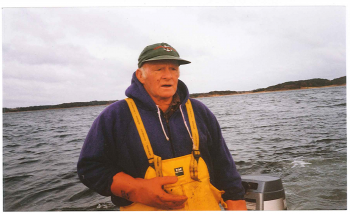Luther Eldredge

Cape Cod Shellfish Industry Interviews
This is a collection of 15 interviews conducted in 2007 with people on Cape Cod who are involved in the shellfishing industry. Five people who are employed by towns to manage and regulate shellfish (Shellfish Officers), seven people who own shellfish aquaculture businesses (Growers), and four people who harvest wild shellfish commercially (Commercial Harvesters) were asked the question “What does shellfishing mean to you?”. From that starting point, questions centered on how the individual got into shellfishing and then what they thought the future of shellfishing might be.
The interviews were conducted by Sandy Macfarlane, a retired shellfish biologist and conservation administrator for the town of Orleans. The work was done under a contract with the Barnstable County Cooperative Extension Marine Program. Each interview is summarized into a written document that varies from 807 to 1557 words long and has an accompanying photograph. The interviews represent geographic, age, gender, and experience diversity as well as shellfish species diversity. All interviewees are year round residents of Cape Cod. One theme that emerged from this work is that shellfishing remains an important component of the Cape Cod economy and culture and those who are involved are concerned about its continued presence.
Luther Eldredge is a seasoned shellfisher whose roots in the trade extend deep into the maritime heritage of Cape Cod. Having been introduced to shellfishing at a tender age by his grandfather, Eldredge has not only witnessed but also actively participated in the evolution of the industry throughout his life. In 2007, Luther Eldredge was harvesting commercially from the wild fisheries and growing oysters on an aquaculture grant that was originally his grandfather's. His personal history is interwoven with the ebb and flow of shellfish stocks, the shifts in community practices, and the broader environmental and economic changes that have shaped the shellfishing landscape on Cape Cod. Eldredge's life story is emblematic of the local shellfishing culture, reflecting a generational passage of knowledge and a profound connection to the coastal environment.
Scope and Content Note
The interview with Luther Eldredge provides a rich narrative of the significance of shellfishing within the Cape Cod community, both as an economic activity and a cultural touchstone. Eldredge shares his extensive experience in the industry, including his early years learning the trade and his observations of the fluctuations in shellfish populations over time. He discusses his involvement in shellfish farming and offers a critical perspective on the expansion of aquaculture, particularly its encroachment on areas that have not been traditionally productive. Additionally, Eldredge addresses the impact of tourism on the demand for shellfish, suggesting a complex interplay between local practices and external market forces. Eldredge always returned to shellfishing when that work ran out. He discusses changes in the abundance of eelgrass, sea lettuce, and various species of shellfish, snails, and crabs in Town Cove, the companies he has sold his product to and what prices he received, dividing his grandfather's grant and allowing other people to work on it, the gear he uses to grow oysters and what his market is, using his grant to store shellfish, complaints he has received about his grant from shoreline property owners, his concerns about the increase in the number of docks and piers that have been built and how they affect the sediment, the siting of aquaculture grants in Town Cove, and gathering water from springs. The interview underscores the centrality of shellfishing to the identity and livelihood of the Cape Cod community while also acknowledging the challenges that need to be navigated to ensure the sustainability and resilience of the industry.
Please Note: The oral histories in this collection are protected by copyright and have been created for educational, research and personal use as described by the Fair Use Doctrine in the U.S. Copyright law. Please reach out Voices@noaa.gov to let us know how these interviews are being used in your research, project, exhibit, etc. The Voices staff can help provide other useful resources related to your inquiry.
The NOAA mission is to understand and predict changes in climate, weather, oceans, and coasts, to share that knowledge and information with others, and to conserve and manage coastal and marine ecosystems and resources. The Voices Oral History Archives offers public access to a wide range of accounts, including historical materials that are products of their particular times, and may contain offensive language or negative stereotypes.
Voices Oral History Archives does not verify the accuracy of materials submitted to us. The opinions expressed in the interviews are those of the interviewee only. The interviews here have been made available to the public only after the interviewer has confirmed that they have obtained consent.
